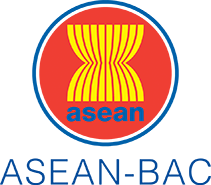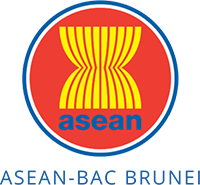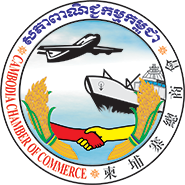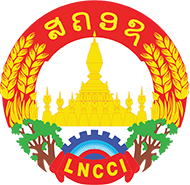
Volume 6 – April 2021
Greetings from DISG Secretariat
Dear Readers,
I hope all of you are safe and well. Last month we saw a glimpse of hope across the region as vaccine drives have begun in most nations on ASEAN side, while state of emergency for Tokyo area ended in Japan. Last month was also an important point for many Japanese as it marked 10 years since Great East Japan Earthquake on March 11th, 2011. The affected areas have made steady progress in their reconstruction through the tireless efforts of the local people, though many challenges remain.
We sincerely thank all ASEAN people who gave us hearty support and strong encouragement. You can learn the progress of the reconstruction and the various efforts made behind it during the past decade from here.
Newsletter Contents:
- The RCEP; Regional Comprehensive Economic Partnership Agreement
- Strengthening Supply Chain Resilience between ASEAN and Japan
For ASEAN-Japan economic cooperation perspective, we would like to highlight two topics for this month, 1) The RCEP; Regional Comprehensive Economic Partnership Agreement, and 2) Strengthening Supply Chain Resilience between ASEAN and Japan.
For 1st topic, let us share the recent Japanese government’s actions related to the RCEP such as cabinet approval of ratification made on February 24th and the first published estimate of impact of the RCEP. For AMEICC secretariat/ DISG task force, we held our latest DISG webinar of the series about the RCEP on March 24th.
For 2nd topic, we recapped the importance of supply chain resilience as one of the major pillars in the ASEAN-Japan Economic Resilience Action Plan. In the course of the initiative, JETRO and METI held a forum online on the subject of approaches to enhancing the resilience of supply chains on March 11th and 12th. Furthermore, JETRO opened the call for applicants for 4th “Program for Strengthening Overseas Supply Chains” on March 26th.
The RCEP; Regional Comprehensive Economic Partnership Agreement
Japan cabinet approved to ratify the RCEP
Japan's Cabinet on February 24th, 2021 approved a bill to ratify the Regional Comprehensive Economic Partnership (RCEP), the world's largest free trade deal signed last year by 15 Asia-Pacific countries; 10 ASEAN member states, Japan, China, The Republic of Korea(ROK), Australia and New Zealand.
The RCEP, covering more than 30% of global trade and population, will become the "foundation of trade in Asia", H.E. Kajiyama Hiroshi, Minister of Economy, Trade and Industry told a press conference.
"To establish a desirable economic order in the region through the steady implementation of this agreement, I hope that it will be approved by parliament at an early date", H.E. Kajiyama said.
The estimate of the impact of the RCEP by Japanese government
Japanese government published its first estimate of the impact of the RCEP on March 19th, 2021. According to that, in terms of the country’s real gross domestic product (GDP) in FY 2019, the expected economic effect from the RCEP corresponds to a GDP increase of around ¥15 trillion ($140 billion) equivalent to boost by about 2.7%. Also the estimate show that the RCEP would create around 570,000 jobs.
The projected boost is larger than the government’s previous estimates of a 1.5% increase from the Comprehensive and Progressive Agreement for Trans-Pacific Partnership(CPTPP) and a 1.0% rise from the economic partnership agreement with the European Union. The estimates for the CPTPP and the pact with the European Union were released in December 2017.
One of the reason why such a big economic effect is expected is that the RCEP is Japan’s first trade deal involving both China and The Republic of Korea. China is Japan’s largest trading partner in terms of the total sum of imports and exports, and The Republic of Korea is its third biggest.
See here for further details of the estimate. (Available in Japanese only)
The 5th DISG Webinar of the Series:
"The background, significance, implications and future prospects of the RCEP from the viewpoint of evolving regional economic architecture"
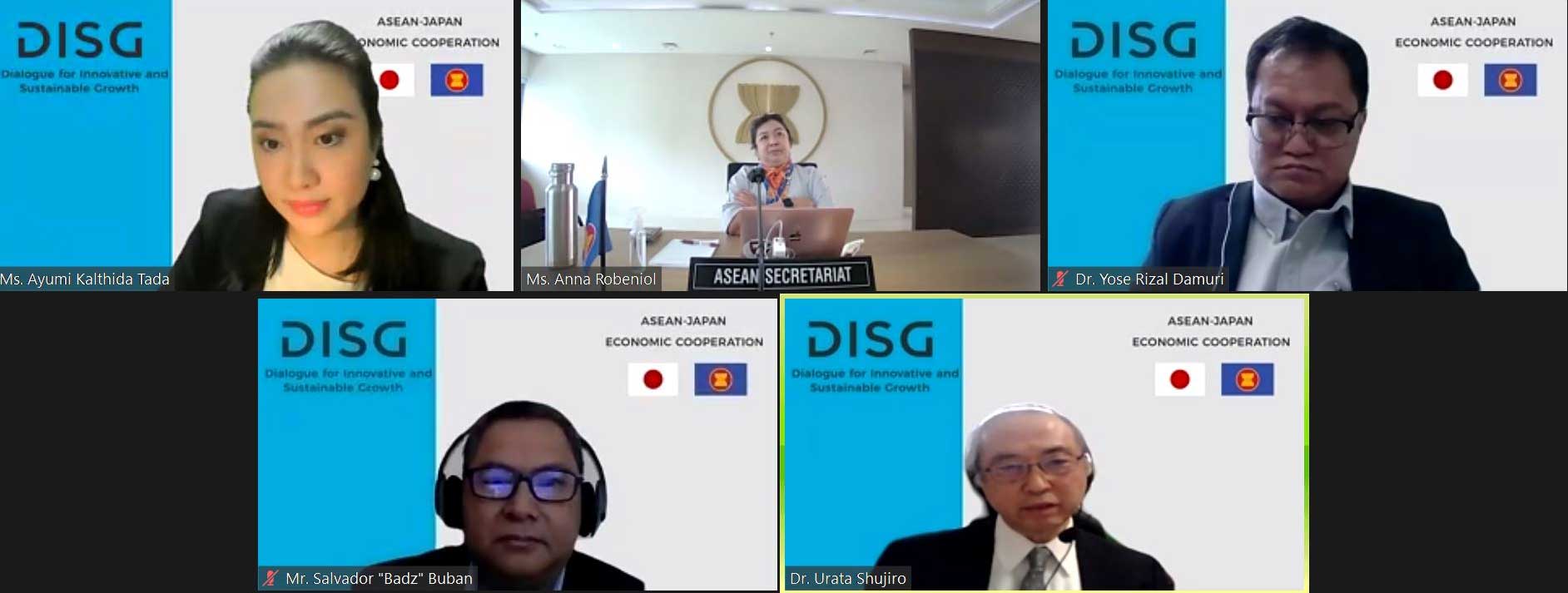
The webinar was begun with the keynote speech from Dr. Tamura Aki, Director-General for Trade Policy, METI, Japan, where he shared his experiences as the chief negotiator for RCEP and emphasized the signing of the RCEP in COVID-19 pandemic can be a signal to the world that the RCEP countries are committed to supporting open markets and promoting trade cooperation.
After that, the panel discussion was held with distinguished four panellists, Ms. Anna from ASEC, Dr. Urata from Waseda University, Mr. Buban from ERIA and Dr. Damuri from CSIS. They discussed three topics, 1) background and development of the RCEP negotiations, 2) significance of the RCEP Agreement, and 3) implications and future prospects of the RCEP.
For the first topic, Ms. Anna highlighted ASEAN’s leadership, Japan and Australia’s contribution toward the launch of the negotiations, and ASEAN Foreign Partners’ (AFPs’) contribution while Dr. Damuri mentioned ‘ASEAN centrality’ will play important role in the implementation of the RCEP.
For the 2nd topic, Ms. Anna emphasized the RCEP is the biggest contribution on regional effort for the recovery of post pandemic. Then, Dr. Urata said the RCEP established rule-based, good faith and open trade system in Asia region including China and The Republic of Korea. Mr. Buban mentioned that consolidating the rules of origin in ASEAN is also significant contribution of the RCEP.
For the 3rd topic, Dr. Damuri identified two main trends, 1) the rearrangements of supply chains, and 2) the growing importance of digital economy. Dr. Urata said that ASEAN and Japan could formulate a strategy to take a leadership role in expanding the framework such as the RCEP, CPTPP and Free and Open Indo-Pacific to other regions.
Please see here for further details of contents.
The next webinar will be held in the Late April, the theme will be related to Energy.
Strengthening Supply Chain Resilience between ASEAN and Japan
Supply chain resilience in the ASEAN-Japan Economic Resilience Action Plan
ASEAN and Japan Economic Ministers (AEM-METI) released the “ASEAN - Japan Economic Ministers’ Joint Statement on Initiatives on Economic Resilience in Response to the Corona Virus Disease (COVID-19) Outbreak” (see here for the details) on April 22nd 2020.
Based on the initiative, the “ASEAN-Japan Economic Resilience Action Plan” (see here for the details) was adopted at the Special AEM - METI Consultations on July 29th 2020. The Action Plan contains over 50 concrete projects for economic and industrial cooperation to accomplish three objectives: (i) sustaining the close economic ties developed by ASEAN and Japan; (ii) mitigating the adverse impact of COVID-19 on the economy; and (iii) strengthening economic resilience.
For objective (iii) strengthening economic resilience, there are 4 pillars of action items and 2 of those are related to supply chain resilience; “Initiate programs to strengthen supply chain resilience centered on ASEAN, including through enhancing business and academic experts’ participation”, and “Formulate a cooperative framework aimed at building capacity on emergency preparedness and response for supply chains”. It clearly demonstrates significance of “supply chain resilience” as the key issue in ASEAN-Japan cooperation.
Supply chain resilience forum held by JETRO and METI
On March 11th and 12th, 2021, the Japan External Trade Organization (JETRO), in cooperation with the Ministry of Economy, Trade and Industry (METI), held a forum online on the subject of approaches to enhancing the resilience of supply chains with the attendance of representatives of the industrial, government and academic sectors from ASEAN, Japan, Australia and India.
The forum was begun with the opening remarks by Mr. Sasaki Nobuhiko, Chairman and CEO of JETRO, followed by keynote speech from H.E. Tanaka Shigehiro, Vice-Minister for International Affairs, Ministry of Economy Trade and Industry, Japan.
After that, the four discussion sessions was held: (1) Challenges and Solutions for More Resilient Supply Chain – Diagnosis Reflecting the Voices from Companies in the Region, (2) Case Studies - Diversification of Procurement Sources and/or Production bases, (3) Policy Supports and Other Services Available to Companies for More Resilient Supply Chain, (4) Future Landscape of Supply Chain Resilience in the Region.
Please see here for the overview of the events.
Please see here for the details of the contents.
The Call for applicants for 4th “Program for Strengthening Overseas Supply Chains”
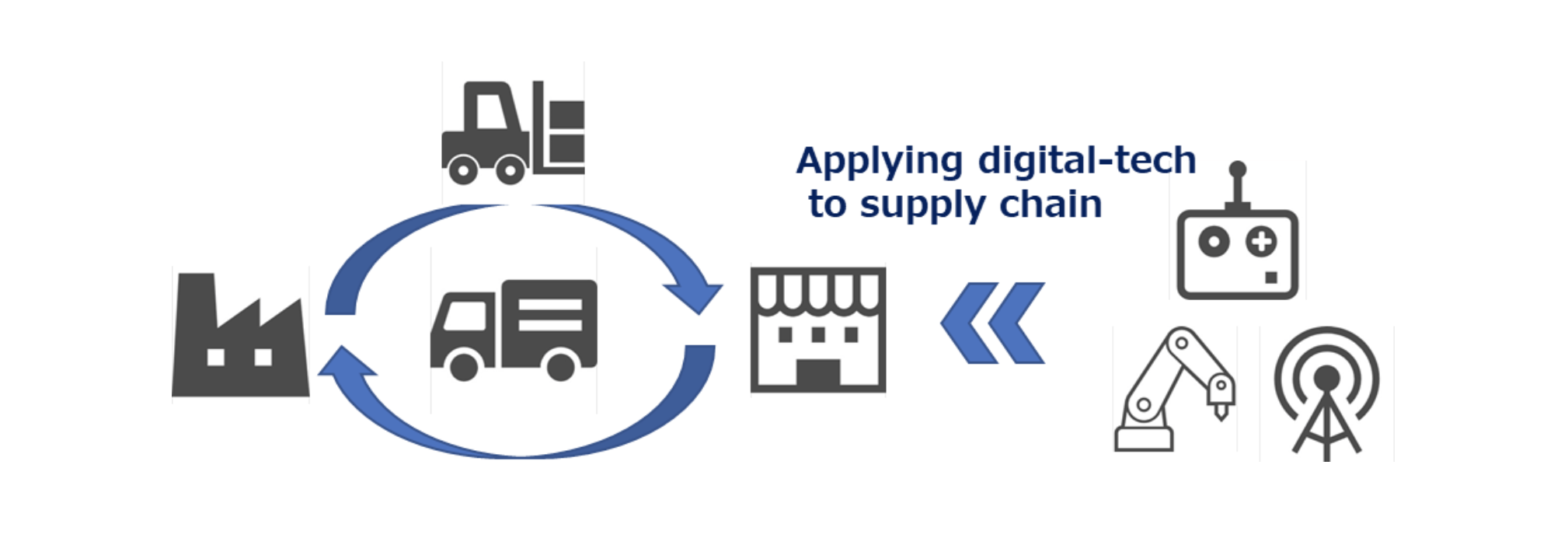
The Financial Support Program for Strengthening Overseas Supply Chains, the program funded by METI Japan, had launched last year as the one of the flagship programs among ASEAN-Japan Economic Resilience Action Plan, aiming to enhance the viability of industries by strengthening supply chain resilience between ASEAN and Japan. So far, three batches of the program were released and totally 81 projects were adopted; 30 projects in 1st batch, 21 projects in 2nd batch and 30 projects in 3rd batch. As we introduced in our Newsletter in January, this program was included in the third supplementary budget for fiscal 2020 aimed at ensuring the coronavirus-stricken economy stays on a recovery track. The additional budget for this program is 11.67 billion JPY. Finally, on 26 March, the call for applicants for the fourth batch of the program was opened. We believe this program should contribute to strengthening supply chain resilience in ASEAN.
Please see here for the details. (available in Japanese only)
Editorial Note
We thank everyone for your interest and support. Please look forward to the future webinar series and information dissemination through newsletters and our website, social media, etc. As announced in this newsletter, the next webinar will be held in the Late April. The theme will be related to “Energy”.
-------------------------------------------
Mr. KOBAYASHI Hirokazu
Chair of AMEICC DISG Task Force
Executive Director, JETRO Singapore



